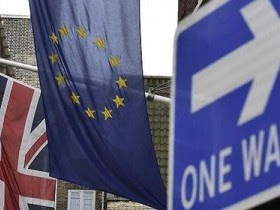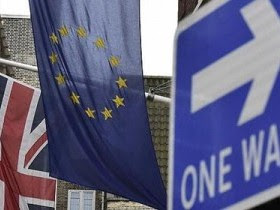May vows to stop free movement of EU citizens to Britain
The British Prime Minister with her latest moves, including the announcement of early elections, shows the stance she will take during the negotiations for her country's exit from the European Union
The British Prime Minister Theresa May seems determined for a tough divorce with the European Union (EU). This is confirmed by two facts.
First, on Tuesday, he surprised everyone by submitting a request for early recourse to the polls, a request that was accepted by an overwhelming majority on Wednesday by the House of Commons.
Second, according to a Daily Mail article citing unnamed Conservative sources, May will formally commit in the run-up to the June 8 snap-election to end the free movement of EU citizens to Britain. According to the report, in her election manifesto, the British Prime Minister will also pledge that her country will withdraw from the EU single market and the European Court of Justice, the same publication states.
Mogherini Warnings
And as London prepares for a tough Brexit, EU foreign policy chief Federica Mogherini warned Britain yesterday that it was expected to lose not only the EU but more because of its decision to leave the bloc. "They have to disconnect from joining a community. "We will lose an important member state," she told students at elite Tsinghua University.
"I have to tell you that for me all member states are equally important, because some may contribute more than others to specific issues. "But I believe that our British friends will lose more than we do."
Schedules remain as they are
It is noted that the British Prime Minister officially started the divorce process from the EU last month, saying that there is no return and the country has entered a period of exit which will test the cohesion of the bloc and lead itself to the unknown. After that, Britain has two years to negotiate the terms of the divorce before Brexit takes effect at the end of March 2019.
The Brexit process is set to begin in June, ahead of early parliamentary elections, the EU announced on Wednesday. The British Parliament has voted in favor of May's decision to go to the polls early.
"It is clear from our Treaties that it is two years, only two years since the start of negotiations, that is, since last March. This can not be delayed. "I do not expect it to happen soon," Mogherini said.
Concern in China
At the same time, China is watching with concern the Brexit process due to the instability that may be caused in the EU, Beijing's largest trading partner. When Britain leaves the EU, China is expected to lose about a fifth of its economic output.
"The EU, even after the United Kingdom leaves it, will continue to be the first market in the world, the second largest economy in the world. "I see that all our partners are telling us that the EU is necessary and that is the message I am receiving here in China, that the European Union is an essential partner in the world today."
Messages from Seibel as well
In addition to Mogherini, German Finance Minister Wolfgang Schieble sent messages to London yesterday, saying that it was unrealistic to take further steps towards the completion of EU member states at this point and after the result of the referendum in Britain. for it to leave, its remaining member states must be ready to form "alliances of the willing".
"Given the current situation, it is unrealistic to think that we can take further steps towards deepening European integration for the time being," Seibel said, speaking on the sidelines of the International Monetary Fund (IMF) spring meeting in Washington.
"We need to answer urgent questions in a way that is clearly European, and we need to find European solutions to acute problems," he said. "say it in the specific situation", he concluded.
The election campaign has begun
In the run-up to the June 8 snap-election, based on all opinion polls and analysts, the Corbyn Labor will suffer the biggest defeat in its history.
Predictions rejected by the Labor leader in his speech yesterday. Jeremy Corbyn invoked an unholy alliance, a consortium, as he called it, of the dark forces of the economic and political establishment, which is fighting him fiercely. He challenged all polls showing his party losing 50 to 100 seats, calling them fake and disorienting.
He slammed the media for a dirty war against him and his left-wing choices, and insisted with absolute certainty that his party would finish first and form a bulwark of market forces and reaction. "We will rid the British people of the corrupt system imposed by the plutocracy to serve its own interests," Jeremy Corbyn said in a speech.
At the same time, he rejected a proposal by the Scottish Nationalist Party (SNP) for pre-election co-operation, calling it a "reactionary rather than a progressive political force". In his speech he made absolutely no reference to Europe, an issue that has deeply divided traditional Labor voters.
For her part, Theresa May began her campaign in Bolton, promoting the image of a calm and determined force. To the criticism why she has excluded her participation in a televised battle of leaders, she replied that she prefers direct contact with the voters.
May is clear ahead
The Conservative Party leads the Conservative Party with 48%, followed by the Labor Party with 24%, according to The Times, citing data from the announcement of early elections in Britain announced by Prime Minister Theresa May. of the online polling platform YouGov.
Ahead of the June 8 election, pollsters put the Liberal Democrats at 12%, the UK Independence Party (UKIP) at 7% and the rest at 9%, according to the newspaper.
Source: SigmaLive

